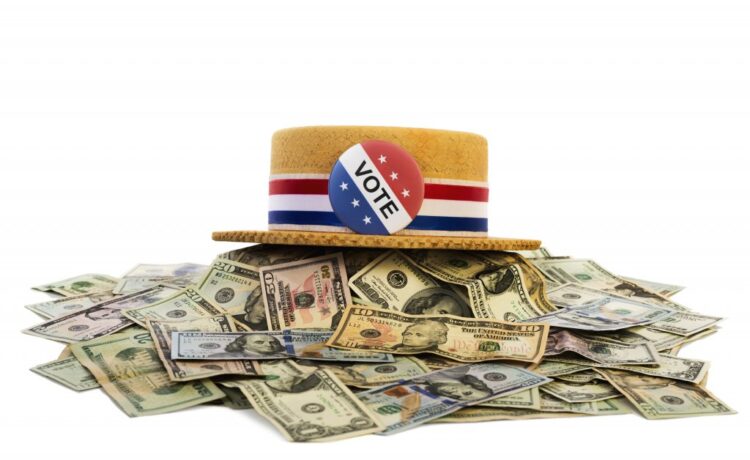Ahead of a Friday afternoon hearing on a last-minute effort from state representatives, labor unions and business groups to pass campaign finance limits, attendees lobbied to open curtains and let the rare February sunlight stream into the Capitol.
“We like sunshine in government,” quipped Sen. Jeff Golden, an Ashland Democrat.
But Golden and other critics of House Bill 4024 said the proposal, hashed out by House Majority Leader Julie Fahey, Minority Leader Jeff Helfrich, labor unions and business groups, hasn’t had the kind of vetting in broad daylight it needs. Critics pointed out the bill still would allow unions and small donor committees to give hundreds of thousands of dollars to candidates, and that lawmakers popped it on the table with just two weeks left to pass bills before the legislative session ends.
“I really don’t know how we go home, look our constituents in the eye and say we seriously reformed our campaign finance system,” Golden said.
Oregon is one of only a handful of states with no limits on contributions to candidates, leading to eye-popping amounts spent on elections. The legislative proposal comes in response to the possibility that voters could be asked to choose between two competing campaign finance ballot measures in November, one proposed by good government groups and one backed by labor unions and progressive organizations.
Angela Wilhelms, president of Oregon Business and Industry, the largest business group in the state, said legislative action is necessary to prevent “clutter, confusion and chaos” that could result from two competing campaign finance initiatives on the ballot. She said she understands skepticism when business and labor, which are deeply involved in elections, work together.
“We’re asking if only for a moment we drop some of that skepticism and recognize that this proposal is a sincere attempt to get things right,” she said.
Lawmakers have tried with varying levels of effort to address campaign finance reform in past years, but they never found a compromise.
“The labor unions have been too inflexible, business leaders have not been willing to come to the table and good government groups have not been willing to consider the practical implications of some of their positions,” said Fahey, a Democrat from Eugene.
If limits are too low, Fahey said, it can lead to more dark money, or spending by groups that evade campaign finance laws in efforts to influence elections. Oregon doesn’t have as much dark money as other states, but lawmakers have been targeted by a D.C.-based nonprofit group that doesn’t disclose its donors.
Carveout for unions
The proposal Fahey and Helfrich unveiled this week would prohibit candidates for state legislative offices, circuit court judges and district attorneys from receiving more than $3,300 per election – or $6,600 assuming a primary and general election – from an individual. A candidate could receive up to $5,000 per election from a political party’s committee, from a multicandidate committee that exists to support multiple candidates and from a legislative caucus’s committee.
The proposed limits increase when it comes to labor unions: Unions and other membership organizations could give up to $16,500 per election, or $33,000 for candidates running in both primary and general election. And small donor political committees, or committees that accept up to $250 per year from individuals, could give up to $33,000 per election for every 2,500 donors to the small donor committee. That means a small donor committee with 10,000 donors could give a candidate $132,000 per election, or $264,000 for an election year with both a primary and general election.
Unions and other membership organizations could give twice as much to candidates for governor and other statewide offices. They could also give hundreds of thousands of dollars worth of services, including hiring the equivalent of three full-time employees to work for a campaign.
Felisa Hagins, executive director of Oregon Service Employees International Union, or SEIU, said the union gave up some of what it wanted but overall supports the proposal.
“There are things that our union care about deeply, like public financing, missing from this proposal,” she said. “But that’s the nature of compromise.”
House Speaker Dan Rayfield, D-Corvallis, told reporters on Thursday that he hasn’t been deeply involved in the latest efforts to rein in campaign contributions and hadn’t yet read through the proposed amendments. Any proposal needs to have bipartisan support and should include input from advocates working on various ballot measures, he said.
Honest Elections Oregon, the group behind campaign finance reform ballot measure Initiative Petition 9, had minimal involvement, attorney Dan Meek said. The group, which is promoting its own campaign finance ballot measure with lower limits and stricter guidelines, first received concepts for the proposal 12 days ago, sent concerns 10 days ago and participated in one two-hour video meeting before seeing the proposal two days ago.
Lawmakers haven’t shown they’re willing to consider real campaign finance reform, Meek said.
“Folks who are elected in a system with no limits kind of like a system with no limits,” he said. “That’s what I’ve found.”
The majority of testimony opposed the proposal.
Patrick Starnes, who ran for governor in 2018 as the Independent Party of Oregon nominee and 2022 as a Democrat, submitted written testimony that just said “SHAME! SHAME! SHAME!” Former state Rep. Marty Wilde, a Eugene Democrat who clashed with his party over his support for campaign finance reform and independent redistricting, sent in three different letters opposing the proposal.
“Let’s be honest here – this is a backroom deal cut in fear of a ballot measure, not an honest attempt to give voice to the 78% of the voters who voted for Measure 107,” he said, referring to a 2020 voter-approved constitutional amendment to allow campaign finance limits. “You should not be a party to the subversion of democracy. It would be better to simply get out of the way and let the voters decide.”
GET THE MORNING HEADLINES DELIVERED TO YOUR INBOX
















